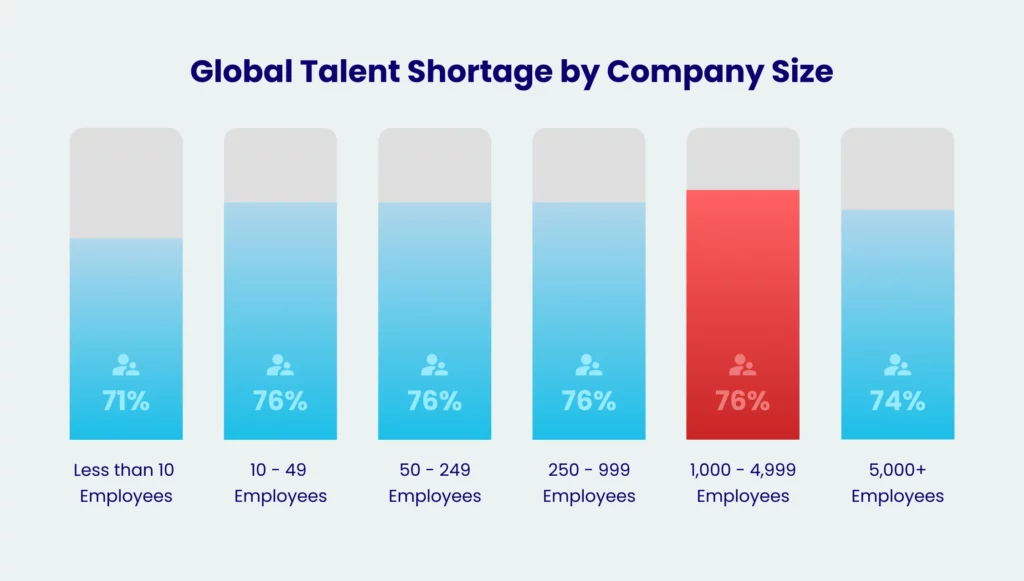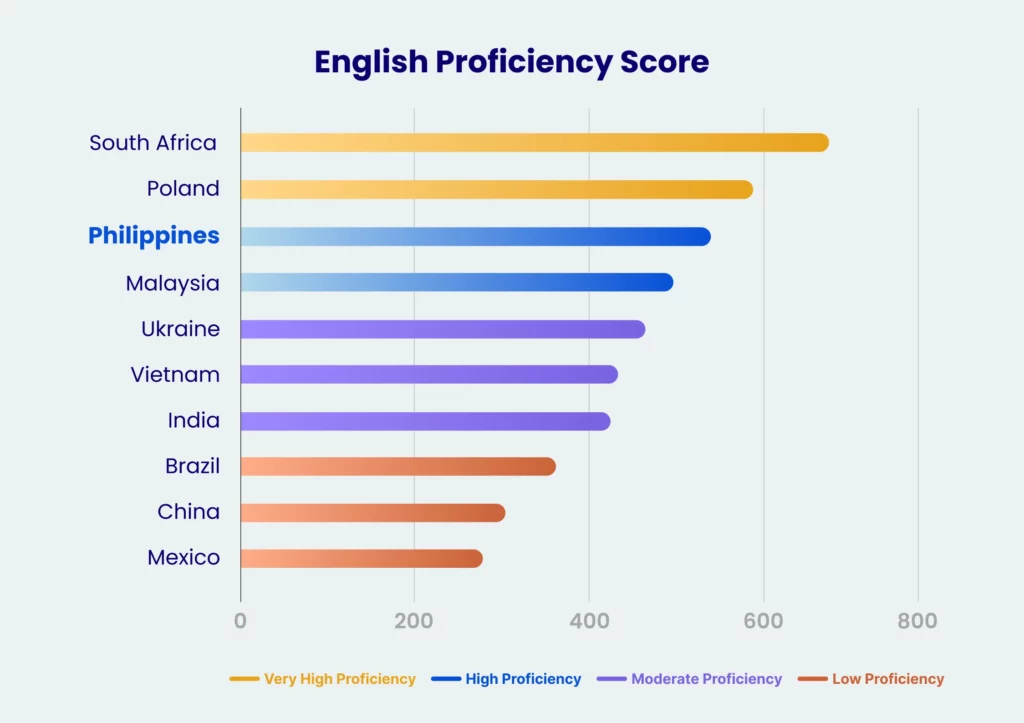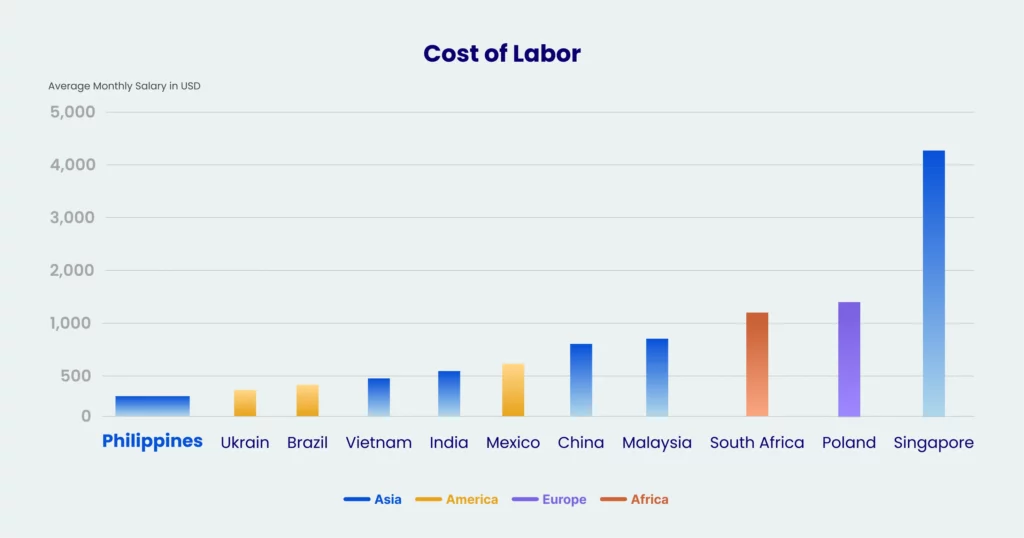Key Takeaways
- U.S. recruitment in 2026 is shaped by persistent talent shortages, rising labor costs, and evolving candidate expectations.
- Remote, offshore, and hybrid hiring models are no longer optional but essential for sustainable growth.
- Recruiters must expand beyond traditional sourcing to access global talent pools effectively.
- Companies that combine strategic workforce planning with offshore talent gain a competitive hiring advantage.
- The future of U.S. hiring favors flexibility, speed, and access to specialized skills
In 2026, U.S. companies are increasingly turning to outsourcing solutions with the Philippines becoming a hub for talented individuals. In fact, the Philippines holds 10-15% of the global BPO Market. Also, over 1.3 million Filipinos are employed in over 1000 BPO companies. This shift is influenced by factors like globalization, the demand for expertise, and the drive to stay ahead in an evolving digital market guided by emerging outsourcing trends in 2026. There’s a growing need for talent in sectors such as healthcare, finance, IT, and creative services and the Philippines is rising to meet these demands.
Emerging hiring trends such as reentry hiring and expanded talent pathways reflect broader shifts in workforce diversity and inclusion strategies.
U.S. companies face the difficulty of attracting and retaining talents with specialized skills in their respective industries. To address this issue, businesses are exploring global outsourcing options in countries like India, Eastern Europe, and Latin America, each offering unique advantages. However, the Philippines stands out as a leading destination, known for its adaptable, skilled professionals who excel in meeting the evolving demands of international business while offering a strong value proposition in terms of cost and service quality.
In a report conducted by ManpowerGroup in 2022, it was revealed that employers across companies of all sizes are struggling with talent shortages, with an average of 75% finding it difficult to source qualified candidates for their workforce.. They expressed a growing demand for individuals possessing skills in emerging technologies. As a result of the recruitment procedures involved, companies are opting to outsource services to streamline their operations and save time. This strategic move enables them to tap into expertise that they may not have internally. According to SHRM’s 2025 Talent Trends Report, nearly 70% of organizations continue to face challenges filling full‑time roles due to competition and skill gaps.Data from BambooHR shows growing challenges in candidate behavior, including job offer rescinds and candidate misrepresentation, reshaping how recruiters evaluate talent.

According to a journal article from the National Library of Medicine, the U.S. healthcare system is experiencing a supply crisis. It is unable to meet the rising and complex needs of the aging population. Another data from the U.S. Bureau of Labor Statistics shows that the job opportunities in healthcare fields are expected to increase compared to other industries from 2023 to 2033. Each year is predicted to have 1.6 Million new job openings in these sectors due to both employment growth and the necessity to replace workers who leave their occupations permanently. The Philippines boasts an array of healthcare professionals such as nurses and medical transcriptionists along with healthcare IT specialists which makes it a top choice for healthcare companies seeking high-quality expertise in outsourcing services.
What Makes the Philippines Unique?
The Philippines has long been a choice for outsourcing services, but in 2026, it has solidified its standing as the top pick for companies seeking specialized skills and talent.
A Plethora of High-Skilled Talents
The workforce in the Philippines is recognized for its background and ability to adapt well to various industries with expertise in engineering and IT among other fields as well as producing more than 1 Million graduates each year making it a rich pool of talent for recruitment in different sectors.
- The IT-BPM sector in the Philippines is projected to generate roughly US$40 billion in revenue in 2025 (up from US$38 billion in 2024), with the workforce growing from about 1.82 million to 1.9 million employees. This growth is driven by strong demand for software development, cybersecurity, digital customer experience, and advanced analytics—giving companies access to a broader selection of technical expertise.
- The Philippines boasts a robust healthcare talent pool, including highly trained nurses, medical coders, and healthcare IT specialists. With its strong focus on medical education and healthcare services, the country consistently produces professionals capable of meeting the technical and clinical demands of global healthcare systems.
As the U.S. healthcare sector faces growing challenges—such as an aging population and the need for advanced technological solutions—the Philippines emerges as a prime outsourcing destination. Its expertise in providing healthcare professionals can help U.S. companies meet their increasing demand for top-notch talent and specialized services, offering a reliable solution to address their workforce shortages.
Cultural Compatibility and English Proficiency
Cultural compatibility and communication are critical factors in successful outsourcing partnerships. The Philippines shares a long history with the U.S. Thus, the a high degree of cultural alignment. Highlighted by its English language proficiency ranking in Asia, the nation’s seamless collaboration between U.S. companies and their Filipino counterparts.
- Communication, without barriers, is a concern for companies that outsource to countries where English is not the primary language; however, this issue is effectively overcome in the Philippines due to its high English proficiency and alignment with Westernized business culture. The Philippines is ranked second in Asia for English proficiency according to a study by the EF English Proficiency Index (EF EPI) and is also a competitive choice among other outsourcing destinations such as Poland, South Africa, Malaysia, and Ukraine for U.S. companies. While Poland and South Africa have higher English proficiency, they significantly have higher labor costs making it less viable as an outsourcing destination. As a result, the Philippines has become the number one choice for U.S. companies looking for cost-effective solutions without compromising on communication quality.
- Filipino professionals are well-versed in working with U.S. clients. The ability to understand cultural nuances, time zone alignment, and client expectations is crucial for delivering high-quality results. This proficiency in client communication has made the Philippines a trusted partner for U.S firms seeking quality outcomes and smooth business transactions.

Cost-effective Access to Niche Expertise
Cost savings are no longer the only factor influencing decisions to outsource work; however; they still contribute significantly to the decision making process. The Philippines stands out as a choice for companies due to its ability to offer a combination of cost effectiveness and top notch quality work standards. This affordable access to professionals enables companies to channel their resources into avenues of development while also keeping them ahead in the competitive landscape.
- The U.S financial services sector is turning to the Philippines for outsourcing tasks like analysis and accounting work as a cost strategy to streamline operations and save money. A statistic shows 66% of businesses in the U.S. outsourced at least one department to enhance their financial workflows efficiently within budget constraints.
- There has been a surge in the need for experts in creative services and digital marketing, such as content creators, graphic designers, and top virtual assistant services that support U.S. businesses. The Philippines has become a destination for outsourcing these services due to the cost advantage and the expertise of professionals who have experience working with international clients. They are well prepared to manage marketing campaigns, content creation, and brand management for companies based in the U.S.

The Future of U.S.-Philippine Outsourcing Partnerships
The increasing practice of businesses turning to the Philippines for workers, from digital marketers to remote closing roles that drive revenue, shows no signs of slowing down in the near future as the world economy evolves and adjusts to changing technology needs. The Philippines is set to have a more significant impact in offering specialized skills to U.S. companies in different industries.
- In the realm of technology and innovation lies the future of outsourcing—a realm where providing solutions key to success. As the tech ecosystem grows, the Philippines keeps on investing in upskilling the workforce in intelligence (AI), blockchain, and cloud computing. This strategic move is placing the country at the forefront of the outsourcing scene making it a prime choice for firms aiming to elevate their business operations by leveraging state of the art technologies. According to Intel Market Research, AI‑driven recruitment tools and automation are driving staffing market growth and reshaping key recruiting functions.
- Philippine companies now offer BPO services that go beyond the Business Process Outsourcing (BPO). They provide services such as legal process outsourcing (LPO) and knowledge process outsourcing (KPO) which cater to businesses requiring legal research and intellectual property management support among other knowledge based tasks.
Why U.S. Companies Should Consider the Philippines for Outsourcing
Given the challenges U.S. businesses encounter with talent shortages and increasing operational costs, outsourcing to the Philippines offers strategic benefits.. With its labor force, cultural compatibility as well as cost-effective access to specialized skill, it serves as a fitting partner for companies aiming to maintain competitiveness in 2026 and beyond.
In industries such as healthcare and IT to finance and digital marketing sectors, U.S. companies have the opportunity to access expertise from the Philippines to meet their needs efficiently and effectively through partnering with companies like Penbrothers that specializes in outsourcing solutions.
Frequently Asked Questions (FAQs)
The biggest trends include remote hiring, skills-based recruitment, and global talent sourcing. Companies are prioritizing flexibility and access to specialized skills over traditional location-based hiring.
U.S. employers face shrinking talent pools, higher wage demands, and increased competition for specialized roles. This has made time-to-hire longer and recruitment costs higher.
Many are turning to offshore and remote hiring to access skilled professionals outside the U.S. This approach helps fill gaps faster while controlling labor costs.
In most cases, offshore hiring complements U.S. teams rather than replaces them. Companies use global talent to fill skill gaps so local teams can focus on strategic and leadership roles.
Yes. Remote and distributed hiring is now a permanent part of workforce strategy, especially for roles in tech, finance, operations, and customer support.






